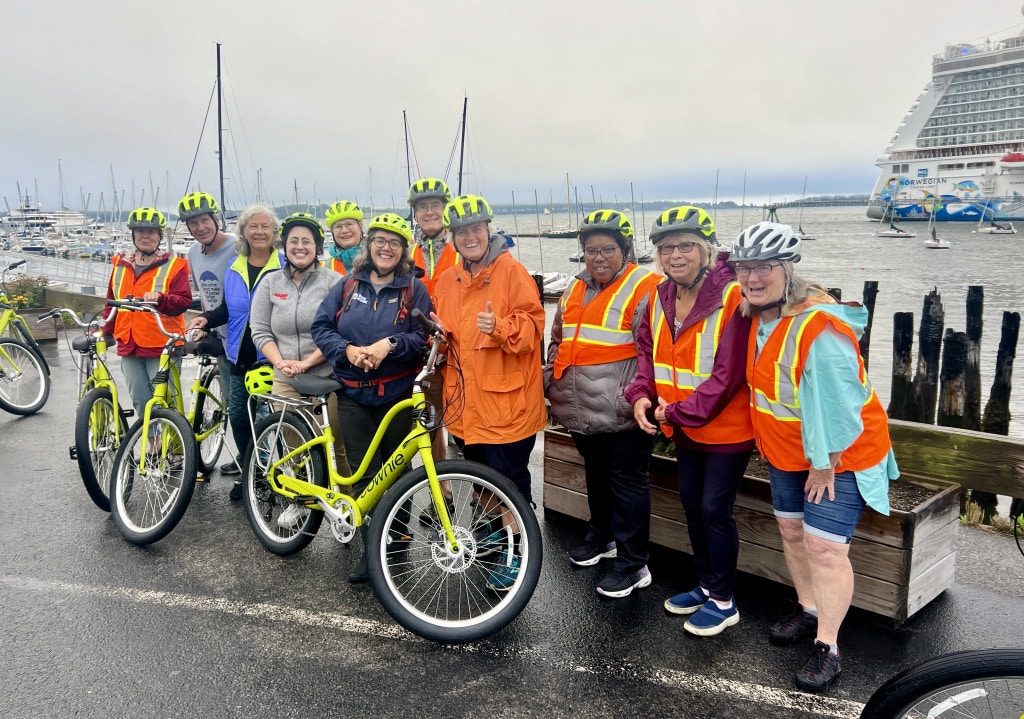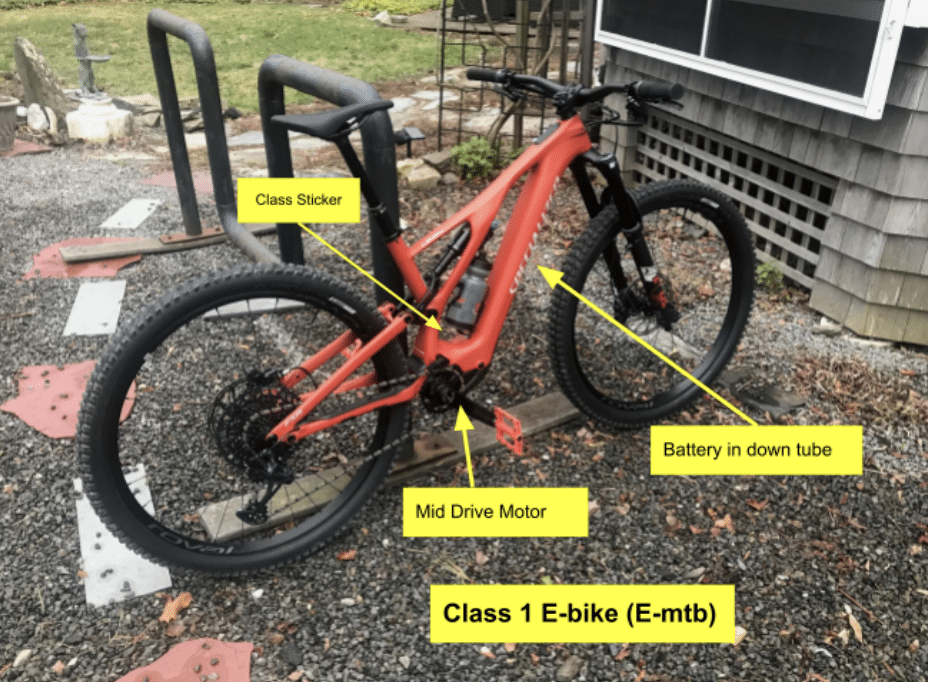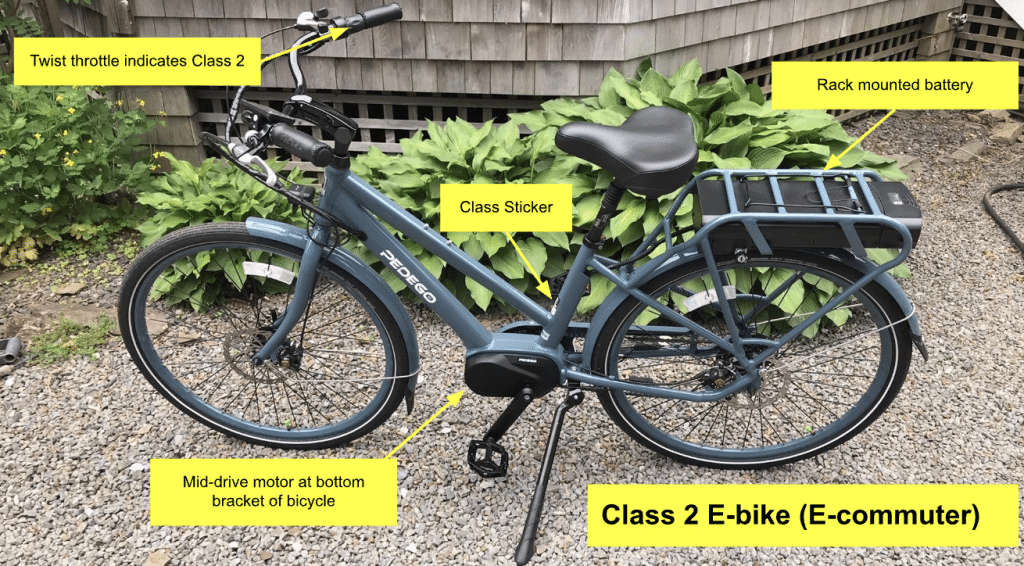Low-speed electric-assist bicycles, known as “e-bikes,” are rapidly growing in popularity around the world. E-bikes are bicycles equipped with a battery and small electric motor (750 watts or less) that provide “pedal assist,” or in some models, throttle-controlled power. They are a fun, clean, quiet, and healthy transportation and recreation option.
Available in styles that include road, mountain, commuter and cargo bikes, e-bikes expand the functional range of a bicycle, provide a viable alternative to a car for many short trips, and enable people with physical limitations to continue to be active.
The Bicycle Coalition of Maine (BCM) supports the use of low speed electric-assist bicycles (“e-bikes”) for transportation and recreational uses, as they can replace cars for many trips, and drive increased investment in active transportation infrastructure. They are also enormously fun! This page is meant to provide an overview of some of the frequently asked questions regarding e-bikes as well as some resources for learning more.

The Bicycle Coalition of Maine, in partnership with the MaineDOT, is pleased to announce the Maine E-bike Demo Ride Program, which can provide Class I electric-assist bicycles for demo rides at select events. Are you a city or town official, member of a government agency, or community group and are interested in how e-bikes might be an effective form of transportation for your organization or municipality?
Bicycle Coalition of Maine/ Maine DOT Library E-Bike Lender Program
The Bicycle Coalition of Maine, in partnership with the MaineDOT, is pleased to announce the launch of a pilot Maine Library E-bike Loan Program, through which residents with library cards at participating libraries can borrow Class I electric-assist bicycles and explore how they can help with car-free personal transportation.
E-Bike FAQs:
What is an e-bike?
Who can use an e-bike?
Where can I use my e-bike?
Where can I charge my e-bike?
What are the rules of the road/laws on an e-bike?
How far can I ride on an e-bike?
Buying an e-bike
Do I need to register or insure my e-bike?
Can I use an e-bike in the winter?
Are e-bikes climate friendly?
What e-bike rebates are available in Maine?
Are e-bikes and their batteries safe?
Questions about conversion kits
Resources and Relevant Articles
What is an e-bike?
Electric assist bicycles, or “e-bikes,’ are bicycles equipped with a battery and an electric motor that provide a “boost” to riders. The batteries are charged using a standard household outlet and a specific cable supplied with the bike. E-bicycles are sold as various classes, i.e. there are Class 1, 2, and 3 Commuters, road bikes, mountain bikes, and cargo bikes etc. E-mountain bikes are typically only Class 1 or 2.
Class 1 E-bikes are “pedal assist only” bicycles, meaning the motor only boosts the rider when the pedals are turning. The motor assist is limited to a top speed of 20mph, and the motor size may not exceed 750 watts. These e-bikes are usable in most places a traditional bicycle can be used.

Class 2 E-bikes are pedal assist but also come equipped with a throttle on the handlebars that permits the motor to be used without the pedals turning. The motor assist is limited to a top speed of 20mph, and the motor size may not exceed 750 watts. These e-bikes are usable in most places a traditional bicycle can be used.

Class 3 E-bikes are “pedal assist only” bicycles, meaning the motor only boosts the rider when the pedals are turning. The motor assist is limited to a top speed of 28mph, and the motor size may not exceed 750 watts. These e-bikes are often restricted under state law, and only legal for use in roadway rights of way or on paths where the managing authority has authorized their use.

39 states (including Maine) have adopted all or parts of the three class e-bike classification system.
Devices that do not comply with these standards are not e-bikes under Maine law, and may be illegal to ride on public rights of way.
Who can use an e-bike?
According to Maine law, persons under the age of 16 may only operate a Class 1 e-bike, and are prohibited from Class 2 and 3 bikes. However a person under 16 years of age may be a passenger on a Class 2 or 3 bike if it is designed to accommodate passengers.
Beyond that restriction, e-bikes are a great option for riders over 16 as a form of recreation and as transportation. There is a rise in use of e-bikes by seniors or people with injuries that have limited their standard cycling, as e-bikes allow them to remain active and extend their cycling careers. Check out this video on who e-bikes are for:
Where can I use my e-bike?
- Class 1 pedal assist e-bikes are allowed anywhere an unpowered bike may be used, including paved and unpaved roads, multi-use paths, and singletrack mountain bike trails unless explicitly prohibited.
- Class 2 e-bikes are allowed in most places an unpowered bicycle may be used, with the exception of mountain bike trails. The BCM does NOT support the use of Class 2 e-bikes on mountain bike trails, as there is some evidence that throttle-actuated bikes are worse for trails and user relations than pedal assist bikes.
- Class 3 pedal assist e-bikes are restricted to paved and unpaved roads, and only on off-road trails for which authorization has been provided.
- The BCM does NOT support the use of devices that have motors larger than 750 watts or that can exceed 28mph as “bicycles.” Such devices are outside of the Three Class regulatory framework established in 2019.
Where can I charge my e-bike?
While it is recommended to charge your bike at your home or work before riding, if you are out and about and looking for a place to charge up, check out www.ebikeanywhere.com to find a public outlet or add one to their list!
What are the rules of the road/laws on an e-bike?
As e-bikes are relatively new devices and are getting a lot of attention, e-bike riders are urged to be the best users out there, whether on the road, trails, or bike paths. Because e-bikes are regulated as bicycles, all operators of e-bikes should obey the laws governing the use of bicycles on Maine roads. All of the duties and responsibilities that apply to the operator of a bicycle in Maine under Title 29-A, Chapter 19, apply to the operator of an e-bike. This means that, at a minimum, all riders of e-bikes should:
- Ride with traffic, and keep right when operating under the speed of other traffic.
- Obey all traffic control devices, including signs, signals, striping, etc.
- Be predictable and communicate turns and lane movements to other users
- Yield to pedestrians on sidewalks and crosswalks
Maine does have some laws specific to e-bikes.
The BCM also recommends, as with unpowered bicycles, that riders use helmets and wear clothing that makes the rider visible to other users.
In addition, e-bike riders should use extra care on multi-use paths and other contexts where there might be other users, and operate below 15 mph in such situations.
How far can I ride on an e-bike?
How far you can travel on an e-bike depends on many variables–how much you pedal (the more you pedal, the more you preserve battery power), how flat/hilly the terrain is, how cold it is, etc. Generally speaking, on a single charge and with the rider putting some effort into pedaling, the average e-bike can reasonably be expected to provide about 25-45 miles of range.
Buying an e-bike
The BCM encourages people to purchase their e-bikes from reputable dealers and shops, preferably locally. Working with a local shop ensures you have an expert helping you to find the right bike for you. They can ensure the e-bike is properly assembled, and can walk you through the basics of operation, answer questions, and be there to provide future maintenance. It also connects you to a community of riders you can reach out to for group rides or suggestions of places to go. You can check out a list of shops in Maine here.
Do I need to register or insure my e-bike?
You do not need to register any bike in Maine, including e-bikes. In terms of insurance here are two useful resources regarding insurance and e-bikes:
Insurance Issues Surrounding E-Bikes
Insuring Your Electric Bicycle 101
Can I use an e-bike in the winter?
E-bikes can be used all year round, however there are some considerations and special care that need to be taken in the winter. Be aware that the cold temperatures will shorten your e-bike’s battery life and plan accordingly. Because of the mechanics of the e-bike, it is important to keep the bike clean and clear of ice and salt after riding. Here are some resources and hints from Electrek and Electric Wheelers.
Are e-bikes climate friendly?
YES! Like other forms of active transportation, e-bikes are a great alternative to cars for many trips. Did you know that 60% of all trips taken in Maine are 5 miles or less? Those trips to school, work, the grocery store, a friends house could likely be replaced by an e-bike. Rough calculations show that replacing just 10% of car trips of 1 mile or less with active transportation would result in emissions reductions equal to taking more than 2000 gas-powered cars off the road! Even The Atlantic agrees about the climate benefits of e-bikes.
What e-bike rebates are available in Maine?
Currently there is a very limited e-bike rebate available through Efficiency Maine. However, check with your town, some local governments are offering e-bike rebates.
In early 2024, Efficiency Maine Trust announced their e-bike rebate program, but it is only available to organizations that serve low and moderate income and is not available to individuals. Research shows that individual e-bike rebates have been successful in many places across the country, including Portland, South Portland, and Freeport. Efficiency Maine is impeding, rather than enabling, the adoption of a transportation tool that can meaningfully lower vehicle miles traveled by limiting the rebate to organizations.
The BCM is formally petitioning the Efficiency Maine Trust to:
- establish a distinct allotment within the Electric Vehicle fund called the Electric Bicycle Fund to receive a yearly stipend of at least $200,000 from the Efficiency Maine Trust to provide a statewide electric bicycle rebate program serving low and moderate income individuals, and
- create a program offering this rebate directly to eligible individuals as determined by the trust at point of sale that will provide at least 50% of the cost of the total price of the bike and any eligible safety accessories with
- The maximum incentive for a standard e-bike and eligible accessories being $1,500, and
- the maximum incentive for a cargo e-bike and eligible accessories being $3,000.
If you are interested in signing our petition please sign here.
Are e-bikes and their batteries safe?
There have been a small number of incidents where the batteries of e-bikes (and other electric devices) overheat and can cause fires. To avoid this remote possibility:
- Ideally, you should charge your battery when you can monitor it, during the day after your commute in, or immediately after you get home.
- Disconnect your battery from the charger when it is fully charged.
- Replace batteries that have been impact damaged due to crashes or dropping them
- Only replace your e-bike’s battery with one that is manufactured or approved by the bicycle maker.
- Only use the charger that came with your e-bike/battery–never use a different charger, even if the ports are compatible.
E-Bike batteries should not be exposed to extreme heat or cold, especially when charging. E-Bike batteries should only be charged during working hours when they can be monitored—no overnight charging. Here is some more information on preventing battery fires.
Questions about Conversion Kits:
The Bicycle Coalition of Maine at this time does not generally support “add on” or “conversion” kits that turn unpowered bicycles into e-bikes. While we recognize that these conversions are somewhat less expensive than full bikes and therefore appealing to some persons interested in e-bikes, we are concerned that:
- These kits may be put on bicycles that do not have frames or braking systems that can handle the extra weight of a battery and motor
- These kits can be quite challenging to install, and inexperienced mechanics may find it impossible to install these kits well enough for safe operation
- These kits may use lower quality batteries and may contribute to fire risks
- Bicycles with these kits installed may be declined service by shops.
The BCM recommends that installation of e-bike conversion kits should only be done by experienced mechanics.
Resources and Relevant Articles:
Podcasts:
Let’s Connect: Everything you want to know about e-bikes– A Maine-based podcast on e-bike basics
People for Bikes:
E-bike Resources
E-Bike Smart Training
Why you Should Support E-bikes, Even if You Don’t Ride One
BCM statements:
BCM position on e-bikes
BCM position on Efficiency Maine Rebate
E-bike examples from other states:
Colorado
Minnesota + https://www.bikemn.org/lets-talk-e-bikes/
Vermont
